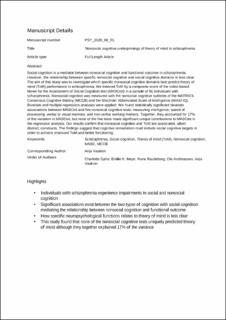Nonsocial cognitive underpinnings of theory of mind in schizophrenia
Journal article, Peer reviewed
Accepted version
Permanent lenke
https://hdl.handle.net/11250/2738866Utgivelsesdato
2020Metadata
Vis full innførselSamlinger
Originalversjon
Psychiatry Research. 2020, 289, 113055 https://doi.org/10.1016/j.psychres.2020.113055Sammendrag
Social cognition is a mediator between nonsocial cognition and functional outcome in schizophrenia. However, the relationship between specific nonsocial cognitive and social cognitive domains is less clear. The aim of this study was to investigate which specific nonsocial cognitive domains best predict theory of mind (ToM) performance in schizophrenia. We indexed ToM by a composite score of the video-based Movie for the Assessment of Social Cognition test (MASCtot) in a sample of 91 individuals with schizophrenia. Nonsocial cognition was measured with the nonsocial cognitive subtests of the MATRICS Consensus Cognitive Battery (MCCB) and the Wechsler Abbreviated Scale of Intelligence (WASI IQ). Bivariate and multiple regression analyses were applied. We found statistically significant bivariate associations between MASCtot and five nonsocial cognitive tests, measuring intelligence, speed of processing, verbal or visual memory, and non-verbal working memory. Together, they accounted for 17% of the variation in MASCtot, but none of the five tests made significant unique contributions to MASCtot in the regression analysis. Our results confirm that nonsocial cognition and ToM are associated, albeit distinct, constructs. The findings suggest that cognitive remediation must include social cognitive targets in order to achieve improved ToM and better functioning.

